新概念英语第1册第113-114课重点语法
新概念英语一113课讲义
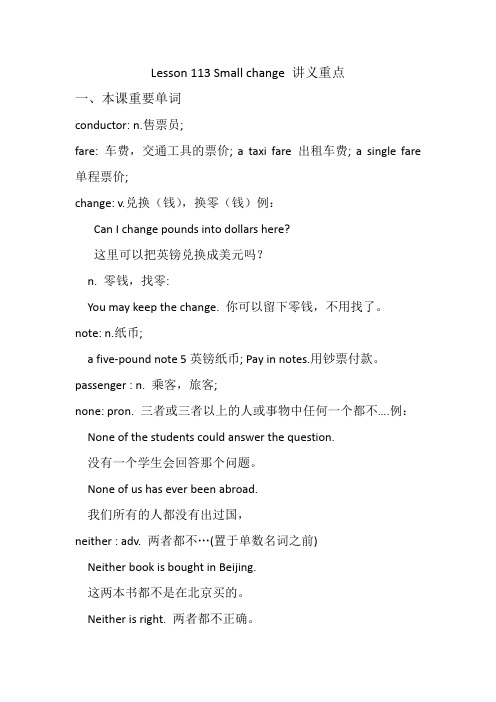
Lesson 113 Small change 讲义重点一、本课重要单词conductor: n.售票员;fare: 车费,交通工具的票价; a taxi fare 出租车费; a single fare 单程票价;change: v.兑换(钱),换零(钱)例:Can I change pounds into dollars here?这里可以把英镑兑换成美元吗?n. 零钱,找零:You may keep the change. 你可以留下零钱,不用找了。
note: n.纸币;a five-pound note 5英镑纸币; Pay in notes.用钞票付款。
passenger : n. 乘客,旅客;none: pron. 三者或三者以上的人或事物中任何一个都不….例:None of the students could answer the question.没有一个学生会回答那个问题。
None of us has ever been abroad.我们所有的人都没有出过国,neither : adv. 两者都不…(置于单数名词之前)Neither book is bought in Beijing.这两本书都不是在北京买的。
Neither is right. 两者都不正确。
get off:下车;tramp: n. 流浪汉,漂泊者’except : prep. 除…之外;二、本课重要知识点:1. Have you any small change? 您有零钱吗?在本句中关于have变疑问句的用法需要引起注意:(1)have用作实意动词表示状态,如表示拥有、患病或用于have to 表示“必须”等,在变疑问句时可以直接将have提前,也可根据情况在句首使用do,does,did,例:I have some small change. 我有一些零钱,变疑问句:常用句式:Do you have any small change?您有零钱吗?不常见句式:Have you any small change? 您有零钱吗?(2)用作实意动词表示动作,如表示“吃(=eat)”、“喝(=drink)”、“度过(=spend)”等,构成疑问式时不能将have提前至句首,而应在句首使用do,does,did,例:He has breakfast at home. 变为疑问句:正确句式:Does he have breakfast at home?他在家吃早餐吗?错误句式:Has he breakfast at home?2. Neither can I. 我也不能。
新概念英语第一册:113-114课 语法及单词解析

There’s none.
没有什么东西。
I bought no magazines.
我没买什么杂志。
I boughtnone.
我没买什么东西。
3.Except us.我们俩除外。
意思是:除了我们,他们都是百万富翁。
语法Grammar in use
so与neither引导的简短回答
以so或neither开头的简短回答,必须用倒装形式,即:So/Neither +助动词+主语。假如前一句是肯定的,后一句就用so开头;如前一句是否定的,后一句则用neither/nor开头。前后两句的时态要一致。
我也如此。
I haven’t got a headache.
我没头疼。
Neither have I.
我也一样。
【篇二】
词汇学习Word study
change v.
(1)兑换:
I want to change the pounds into dollars.
我想把这些英镑兑换成美元。
Could you change me a one-pound note, please?
我也一样。
I don’t want any tea.
我不想要任何茶。
Neither do I.
我也一样。
I wasn’t tired this morning.
我今天不累。
Neither was I.
我也如此。
I didn’t buy a new car lastyear.
我去年没买新车。
Neither did I.
我们调换一下座位好吗?
You've got to change your bus at the next stop.
新概念英语第一册惯用语整理:Lesson113-114

新概念英语第一册惯用语整理:Lesson113-114Lesson 113~1141.get v. 接到;得到;购买;变得;移动;到达使(某人为你做某事);遭受;经受;染上(疾病);理解;使恼火get nowhere 毫无进展,毫无进步(make no progress)例句:I'm getting absolutely nowhere with these physics problems.做这些物理题我毫无进展。
A:I'm getting absolutely nowhere with these physics problems.A:我做这些物理题毫无进展。
B:How about my going through them with you?B:我和你一起研究一遍怎么样?get the thumbs up 同意,认可例句:Tom's project has got the thumbs up from his advisor.汤姆的课题已经得到了他导师的认可。
get to 找到;到达,赶到A:Were you able to reach Lucy at home?A:你给露西家里打电话,有没有找到她?B:I couldn't get to a phone.B:我找不着电话。
例句:1.Is there a bus I can get to the station?有没有去车站的汽车?2.Get to the movie theater by seven and you won't have to wait in the ticket line.7点之前赶到电影院,这样就不要排队买票了。
go into particulars 描述细节例句:Give me a rough idea of what you are going to do. You don't have to go into particulars.简要跟我说一下你要做什么。
新概念1第L113-114课件

New words and expressions 1 conductor [kən'dʌktə] n.售票员 2 fare [feə] n.车费,车票 3 change [tʃeindʒ] v.兑换(钱) 4 note [nəut] n.纸币 5 passenger ['pæsindʒə] n.乘客 6 none [nʌn] pron.没有任何东西 7 neither ['naiðə, 'ni:ðə] ad.也不 8 get off 下车 9 tramp [træ mp] n.流浪汉 10 except [ik'sept] prep.除…外
• Haven’t you got any small change?
• 否定疑问句,表示人惊奇不满或愤怒等情绪。
否定疑问句 否定词开头 "难道不......" • 难道你自己不会做吗? • Can’t you do it yourself? • 难道你不想和我们一起去吗? • Don’t you want to go with us? • Have got = have
beside=next to=near 在附近,在旁边
• 再试比较:
• ①We all went except him.
• 除他之外,我们都去了。(他没有去)
• ②We all went besides him. • 除他之外,我们大家也都去了。(他也去了)
• 1. we go to school every day except Sunday.
• I’ve got no small change. I’m afraid. • no+ n. = not…any + n. (所有的东西全然没有)
新概念英语第一册第113-114课-small change
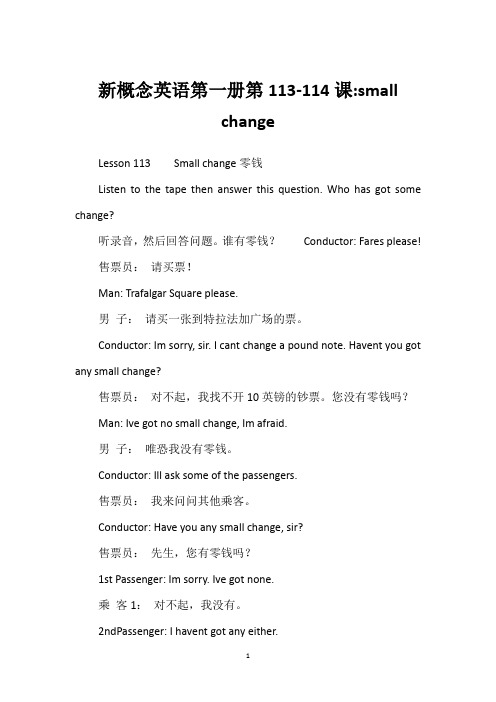
新概念英语第一册第113-114课:smallchangeLesson 113 Small change零钱Listen to the tape then answer this question. Who has got some change?听录音,然后回答问题。
谁有零钱?Conductor: Fares please!售票员:请买票!Man: Trafalgar Square please.男子:请买一张到特拉法加广场的票。
Conductor: Im sorry, sir. I cant change a pound note. Havent you got any small change?售票员:对不起,我找不开10英镑的钞票。
您没有零钱吗?Man: Ive got no small change, Im afraid.男子:唯恐我没有零钱。
Conductor: Ill ask some of the passengers.售票员:我来问问其他乘客。
Conductor: Have you any small change, sir?售票员:先生,您有零钱吗?1st Passenger: Im sorry. Ive got none.乘客1:对不起,我没有。
2ndPassenger: I havent got any either.乘客2:我也没有。
Conductor: Can you change this pound note, madam?售票员:夫人,您能把这10英镑的钞票换开吗?3rd Passenger: Im afraid I cant.乘客3:唯恐不能。
4th Passenger: Neither can I.乘客4:我也不能。
Conductor: Im very sorry, sir. You must get off the bus.None of our passengers can change this note. Theyre all millionaires!售票员:特别愧疚,先生。
(完整版)新概念英语第一册Lesson113-114
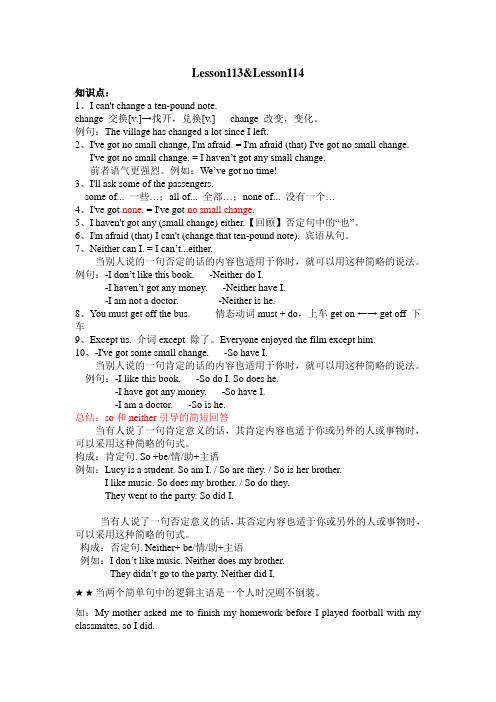
Lesson113&Lesson114知识点:1、I can't change a ten-pound note.change 交换[v.]→找开,兑换[v.] change 改变,变化。
例句:The village has changed a lot since I left.2、I've got no small change, I'm afraid. = I'm afraid (that) I've got no small change.I've got no smal l change. = I haven’t got any small change.前者语气更强烈。
例如:We’ve got no time!3、I'll ask some of the passengers.some of... 一些…;all of... 全部…;none of... 没有一个…4、I've got none. = I've got no small change.5、I haven't got any (small change) either.【回顾】否定句中的“也”。
6、I'm afraid (that) I can't (change that ten-pound note). 宾语从句。
7、Neither can I. = I can’t...either.当别人说的一句否定的话的内容也适用于你时,就可以用这种简略的说法。
例句:-I don’t like this book. -Neither do I.-I haven’t got any money. -Neither have I.-I am not a doctor. -Neither is he.8、You must get off the bus. 情态动词must + do,上车get on ←→ get off 下车9、Except us. 介词except 除了。
新概念英语第1册课程讲义Lesson113-114

Lesson 113 单词讲解1. conductor: 售票员2. fare: 车费,车票A. 车费:the bus\train\taxi\air fareHe didn't have enough money to pay his train fare.B. 车票:Tickets\ Fares, please.3. change: 兑换(钱)A. v. 兑换(不同面值)Can you change a ten-pound note?B. v. 兑换(不同货币)Where can I change my English money into dollars?change…into…B. n. 找回的钱、零钱(不可数)I want my change.Do you have any small change?4. note: 纸币coin: 硬币a fifty-pound notea fifty pounds notetwo fifty-pound notestwo fifty pounds notesa fifty-cent coina fifty cents cointhree fifty-cent coinsthree fifty cents coins5. passenger: 乘客6. none: 没有任何东西no-not- never- none- negative-neithernone= no+ n.He has no money, no girlfriend, no house.He has none.7. neither: 也不8. get off : 下车get in the carget on the train9. tramp: 流浪汉10. except: 除…之外prep.They all went to sleep except me.除我之外,他们都去睡觉了。
新概念英语第一册重点内容摘录113-144课

第一册第113-144课(113-114)Fares, please! 请买票!I can't change a ten-pound note. 我找不开10英镑的钞票。
Haven't you got any small change? 您没有零钱吗? I've got no small change, I am afraid. 恐怕我没有零钱。
I'll ask some of the passengers. I've got none. I haven't got any either. Can you change this ten-pound note, madam? I'm afraid I can't. Neither can I. 我也不能。
None of our passengers can change this note. They're all millionaires! Except us. I've got some small change. So have I.课文详注1.I can't change a ten-pound note.这里 change是动词,意为“兑换”。
change还可作名词,意为“零钱”。
2.I've got none.我没有。
这里指零钱(不可数名词)。
none也可与可数名词连用None of our passengers can change this note.我们的乘客中没有一个能破开这张钞票的。
语法so与neither引导的简短回答:以so 或 neither开头的简短回答,必须用倒装形式,即:So/Neither 助动词主语。
假如前一句是肯定的,后一句就用so开头;如前一句是否定的,后一句则用neither/nor开头。
前后时态要一致。
新概念课堂笔记第一册Lesson113-114.pdf
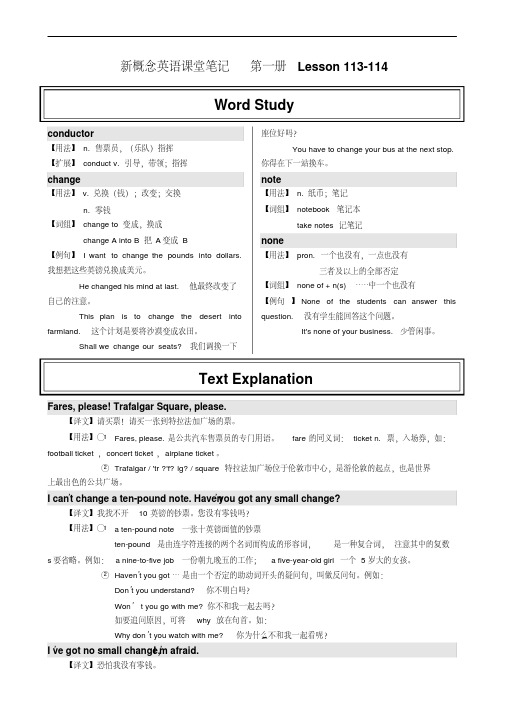
新概念英语课堂笔记第一册Lesson 113-114Word Studyconductor【用法】n. 售票员,(乐队)指挥【扩展】conduct v. 引导,带领;指挥change【用法】v. 兑换(钱);改变;交换n. 零钱【词组】change to 变成,换成change A into B 把A变成 B【例句】I want to change the pounds into dollars. 我想把这些英镑兑换成美元。
He changed his mind at last. 他最终改变了自己的注意。
This plan is to change the desert into farmland. 这个计划是要将沙漠变成农田。
Shall we change our seats? 我们调换一下座位好吗?You have to change your bus at the next stop. 你得在下一站换车。
note【用法】n. 纸币;笔记【词组】notebook 笔记本take notes 记笔记none【用法】pron. 一个也没有,一点也没有三者及以上的全部否定【词组】none of + n(s) ……中一个也没有【例句】None of the students can answer this question. 没有学生能回答这个问题。
It's none of your business. 少管闲事。
Text ExplanationFares, please! Trafalgar Square, please.【译文】请买票!请买一张到特拉法加广场的票。
【用法】○1Fares, please. 是公共汽车售票员的专门用语。
fare的同义词:ticket n. 票,入场券,如:football ticket,concert ticket,airplane ticket。
○2Trafalgar / 'tr?'f?lg? / square 特拉法加广场位于伦敦市中心,是游伦敦的起点,也是世界上最出色的公共广场。
新概念英语第1册第113-114课重点语法
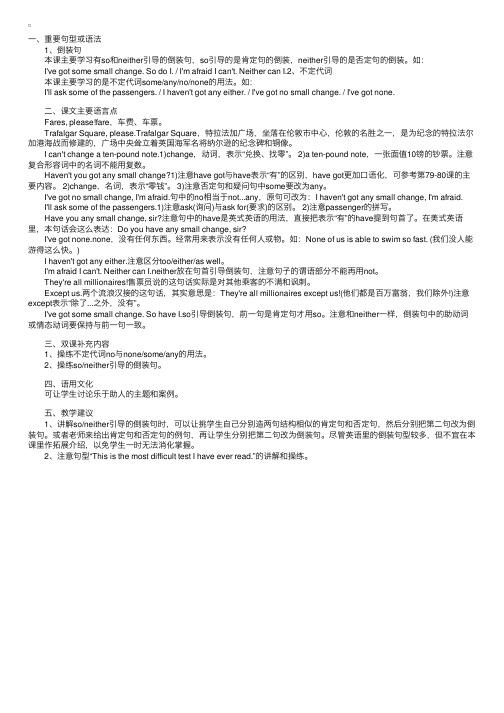
⼀、重要句型或语法 1、倒装句 本课主要学习有so和neither引导的倒装句,so引导的是肯定句的倒装,neither引导的是否定句的倒装。
如: I've got some small change. So do I. / I'm afraid I can't. Neither can I.2、不定代词 本课主要学习的是不定代词some/any/no/none的⽤法。
如: I'll ask some of the passengers. / I haven't got any either. / I've got no small change. / I've got none. ⼆、课⽂主要语⾔点 Fares, please!fare,车费、车票。
Trafalgar Square, please.Trafalgar Square,特拉法加⼴场,坐落在伦敦市中⼼,伦敦的名胜之⼀,是为纪念的特拉法尔加港海战⽽修建的,⼴场中央耸⽴着英国海军名将纳尔逊的纪念碑和铜像。
I can't change a ten-pound note.1)change,动词,表⽰“兑换、找零”。
2)a ten-pound note,⼀张⾯值10镑的钞票。
注意复合形容词中的名词不能⽤复数。
Haven't you got any small change?1)注意have got与have表⽰“有”的区别,have got更加⼝语化,可参考第79-80课的主要内容。
2)change,名词,表⽰“零钱”。
3)注意否定句和疑问句中some要改为any。
I've got no small change, I'm afraid.句中的no相当于not...any,原句可改为:I haven't got any small change, I'm afraid. I'll ask some of the passengers.1)注意ask(询问)与ask for(要求)的区别。
新概念英语NCE1_lesson113-114(共43页)课件

A. everything
B. anything
C. something
D. nothing
数阅
学读
使使
人人
精充
细实
;;
博会
物谈
使使
人人
深敏
沉捷
;;
You made my day!
伦 理 使 人 庄 重 ; 逻 辑 与 修 辞 使 人 善 辩 。
写 作 与 笔 记 使 人 精 确 ; 史 鉴 使 人 明 智 ; 诗
anything, anybody, anyone, nothing, nobody, no one, everything, everybody, everyone 等。这些复 合代词具有名词性质,在句中可用作主语、宾语或 表语,但不能用作定语。
every
some
any
none
everything something anything nothing
B. a ten-dollar note
C. a ten-pound note
3. Has the man got any small change? 4. No, he hasn’t .
Part 2: 1. P1:I’ve got none.
no small change
2. P2:I haven’t got any either.
Would you like something to eat?
3、当anything表示“任何事(物),无论何事
(物)”,anyone,anybody表示“无论谁,任何 人”等意义时,它们也可以用于肯定句中。
Anything is OK.
Anybody knows the answer.
新概念英语第一册语法总结 113~144

LESSON113~144重点语法总结1.倒装句结构(L113)肯定:So+be动词/情态动词/助动词+主语否定:Neither+be动词/情态动词/助动词+主语例:I’m hungry.→So am I. I’m not hungry.→Neither am I.I can fly.→So can I. I can’t fly.→Neither can I.I like apples.→So do I. I don’t like apples.→Neither do I.I have got some milk.→So have I. I haven’t got any milk.→Neither have I.一句话总结:动词用哪个,要像变疑问句那样,根据前面人说的话决定。
注意:①复合不定代词作主语时,谓语动词要用单数。
如:Everyone likes him. (like) Someone is knocking at the door.(be)②被形容词修饰时,形容词要放在复合不定代词的后面。
如:I have something important to tell you.3.过去进行时(L117)概念:表示过去某时正在进行的动作。
结构:主语+was/were+doing (现在分词的变化规则见“现在进行时”)例句:When he arrived, I was having lunch.While I was cooking the dinner, he was working in the garden.Just as I was opening the door, the telephone rang.说明:过去进行时和一般过去时经常同时用在when,while从句里。
过去进行时表示过去正在进行的动作,一般过去时表示比较短暂的动作。
4.过去完成时(L119)概念:两个过去的动作,一个在前发生,一个在后发生,在前面发生的,用过去完成时;在后面发生的,用一般过去时。
新概念英语第一册第113-114课修改版复习课程

2.It’s very clever, it likes eating peaches, and it’s good at climbing trees.
monkey
5.It’s the largest animal on the land with a long nose.
• Neither (adv.) 两者中任何一个都不(放于单数名词前) Nhomakorabea•
eg: Neither answer is correct
• Neither (pron.) 二者都不,常用于neither of结构
•
eg: Neither of us spoke during the journey .
• neither …nor…在连接两个主语时,谓语动词和邻近的
• You may keep the change.
1. None of the reasons was true . 2. None of them have been back yet.
none作主语指代三者或三者以上的可数名 词复数时,谓语用单数也可用复数,常无 多大区别;但当其意重于“每个都不”含 义时,谓语用单数,当其意重于“所有都 不”时,谓语用复数;但用复数较为普遍。 none指代不可数名词时,谓语用单数。 • Eg: None of the workers agrees with him .
• 主语在人称和数上保持一致。 “就近原则”。 “既不......也不......”
• eg: Neither you nor I am wrong .
• either ...... or........或者...或者.. /要么...要么....(谓语动词也是就近原则).
新概念英语第一册113-144课语法点总结
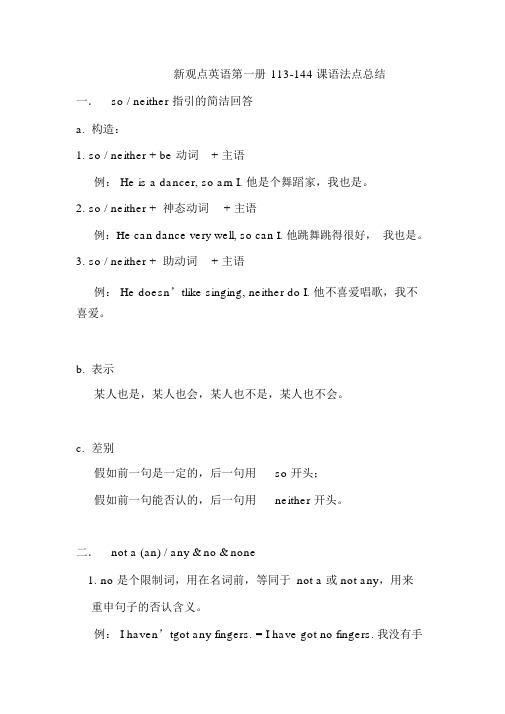
新观点英语第一册113-144 课语法点总结一.so / neither 指引的简洁回答a.构造:1. so / neither + be 动词+ 主语例: He is a dancer, so am I. 他是个舞蹈家,我也是。
2. so / neither + 神态动词+ 主语例:He can dance very well, so can I. 他跳舞跳得很好,我也是。
3. so / neither + 助动词+ 主语例: He doesn’tlike singing, neither do I. 他不喜爱唱歌,我不喜爱。
b.表示某人也是,某人也会,某人也不是,某人也不会。
c.差别假如前一句是一定的,后一句用so 开头;假如前一句能否认的,后一句用neither 开头。
二.not a (an) / any & no & none1. no 是个限制词,用在名词前,等同于not a 或 not any,用来重申句子的否认含义。
例: I haven’tgot any fingers. = I have got no fingers.我没有手指。
I haven’tgot a long tail. = I have got no long tail.我没有一条尾巴。
2.none : 没有人;一个也没有;一点儿也没有例: He has got many interesting books. I have got none.他有好多风趣的,我一本也没有。
三.不定代either; both; all; neither; none二者二者以上一定(都⋯⋯)both all否认(都不⋯⋯)neither none注意: either 表示二者任其一。
例: Which one do you want, an apple or a pear Either is Okay.你想要苹果是梨都能够。
Either of my parents will come to see you.我爸爸或许会来你。
新概念一语法(每课总结) 113~144课

新概念一113-114课(so与neither引导的简短回答)1:以so与neither引导的简短回答,必须用倒装肯定句:so + 助动词+ 主语They can swim.So can I . = I can swim, too.否定句:Neither + 助动词+ 主语I can't help you.Neither can they. = They can't help you, either.2: 假如前一句是肯定的,后一句就用so 开头,如前一句是否定的,后一句则用neither开头,前后二句子时态一致。
So have I.Neither can I.当有人说了一句有肯定( 否定)意义的话,其肯定(否定)的内容也适用于你或另外的人或事物时,可以采用这种简略的句式,注意这种简略句式中的主语和动词(包括be)的顺序。
例:I am hungry.So am I .I met him.So did I.I like ice cream.So do I.I was at church yesterday.So was I.I have got a cold.So have I.(have 直接当情态动词)I don't like ice cream.Neither do I.I wasn't at church yesterday. Neither was I.none 的用法:没有任何东西,代词,可与可数名词或不可数名词连用None of our passengers can change this note.None of the money is mine.Have you got any milk?No, I haven't got any milk.I have got no milk. ( no后面可接名词,而not 后面不能接名词)I have got none.新概念一115-116课(不定代词)不定代词在句子都作单数用:every (用于肯定句中)everyone everybody everything e verywherenone (用于肯定句中)noone nobody nothing nowhe reany (用于否定或疑问句中)anyone anybody anything any wheresome (用于肯定句中)someone somebody something so mewhere通常everyone=everybodyno one = nobodyanyone = anybodysomeone=somebodyDid you see anyone/anybody?No, I saw no one/nobody. = No, I didn't see anyone.Did you hear anything?No,I heard nothing.Did you go anywhere yesterday? No, I went nowhere.There is no one at home.There is nobody at homeThere is nothing in this box.There is someone in the garden. There is something under that chair. My glasses must be somewhere.Have you got anything to wear?No, I haven't got anything to wear.I have got nothing to wear.What about Penny?She has got something to wear.Thank you for helping me.helping 动名词.介词后跟名词,动名词,代词,数词或不定式,但不定式仅限于but与except.新概念一117-118课(过去进行时与时间状语从句)1: 在过去某个特定的时间正在进行或发生的动作.2: 当过去的一个动作发生的时候另个一个动作正在进行.主语+was (were)+ v-ingI was reading a book at 7 o'clock yesterday.I wasn't reading a book at 7 o'clock yesterday.Were you reading abook at 7' o'clock yesterday. What were you doing at 7 o'clock yesterday.时间状语从句:时间状语从句的主句放前面时,用连接词when/while连接.时间状语从句放前面时,要用逗号隔开.注:Someone knocked at the door when I was having breakfast.When I was leaving the house, the postman arrived.He cut himself while he was shaving. (cut 是瞬间动词所以没加ing) While I was cooking the dinner, he was working in the garden.What was you mother doing when the postman came?She was making the beds.She was making the beds when the postman came.When the postman came, she was msking the beds.What was he doing while you were cooking the dinner.He was watching television.He was watching television while I was cooking the dinner.While I was cooking the dinner, he was watching television.We were diving into the city when we had an accident.此题的解释是发生事故是瞬间动词,所以用when, 如果二个动作都是持续动词且同时发生,那么用while.补充点:while 后接的动词必须是延续性动词,while引导的动作正在进行,二个动作通常同时发生.但另一动作可以是瞬间动作。
新概念英语第一册第113-114课

n.售票员 n.车费,车票 v.兑换(钱) n.纸币 n.乘客 pron.没有任何东西 adv.也不
下车
prep.除……外
passenger tramp
They are conductors. The conductor is very handsome. The tramp is homeless.
• 用倒装句完成下列句子: • 1、I didn’t finish my homework, ________________( 她也没做完)。 Neither/Nor did she Neither can I • 2.、She cannot swim, ___________________( 我也不会)。 • 3、We don’t read English every morning, Neither does she 她也不读)。 ___________________( • 4、He hasn’t learnt English for 3 years, Neither have _________________( 他们也没学三年)。 they • 5 、The students aren’t writing, ___________________( 老师也没在写)。 Neither is the teacher
5. ----- You are a good man. ----- _________. A. So am i. B. So I am C. Nor am i.D. Nor I am.
用倒装句完成下列句子: so did she 她也做 1、I finished my homework, __________( 完了)。 so can I 2.、She can swim, ___________( 我也会)。 3、We read English every morning, ____________( so does she 她也读)。 4、He has learnt English for 3 years, so have they 他们也学了三年了)。 _______________( 5、The students are writing, __________________( so is the teacher 老师也在写)。
新概念第一册教案Lesson113-114

Date: April 2nd, April 3rd, 2012Lesson 113 - Small change & Lesson 114 - I’ve got none.I.Teaching Objectives:A.会用表否定的不定代词no, not...any, none。
;B.看着译文可以背诵lessson113;C.掌握公共车辆上买票的一些基本表达法,例如:买票“Fares, please.”,有零钱吗“Do you have any small change?”等。
II.Teaching aids:Radio,picturesIII.Teaching and learning method:Guiding for learning,Task-based Teaching methodIV.Important and difficult points:1、词汇:否定的不定代词no, not...any, none.2、句型:Neither do/have/can I. So do/have/can I. (赞同倒装句)V.Teaching Procedures (2 periods)Period 11. Greetings and Leading-in.T: Good morning, boys and girls!S: Good morning, Miss Li!T: How are you today?S: I’m fine, thank you, and you? /Just so so.T: I’m very well. What’s the weather like today?S: It’s …T: What was the weather like yesterday?S: It was…T: What was the weather like the day before yesterday?S: It was…T: (在黑板上写出最近三天的温度,带领学生说出含有比较级和最高级的句子) So, it’s cold …S: It’s cold today.Today is colder than the day before yesterday.Yesterday was the coldest day of the three.T: Very good(对学生的表现做出评价)…(复习所学内容---比较级与最高级)T: ShowT:¥100 and ¥50 called “整钱”,and ¥1 and ¥0.1 called ?S: “零钱”T: Yes,How to say it in English, do you know?S: …T: Small change. This is what will learn this week. (Write “change” in the blackboard) follow me, changeS: changeT: 这个单词还有个意思?S: 改变T: 大家注意看这个单词,是汉语拼音“change”,嫦娥的出现改变了猪八戒的命运。
- 1、下载文档前请自行甄别文档内容的完整性,平台不提供额外的编辑、内容补充、找答案等附加服务。
- 2、"仅部分预览"的文档,不可在线预览部分如存在完整性等问题,可反馈申请退款(可完整预览的文档不适用该条件!)。
- 3、如文档侵犯您的权益,请联系客服反馈,我们会尽快为您处理(人工客服工作时间:9:00-18:30)。
新概念英语第1册第113-114课重点语法
一、重要句型或语法
1、倒装句
本课主要学习有so和neither引导的倒装句,so引导的是肯定句的倒装,neither引导的是否定句的倒装。
如:
I've got some small change. So do I. / I'm afraid I can't. Neither can I.2、不定代词
本课主要学习的是不定代词some/any/no/none的用法。
如:
I'll ask some of the passengers. / I haven't got any either. / I've got no small change. / I've got none.
二、课文主要语言点
Fares, please!fare,车费、车票。
Trafalgar Square, please.Trafalgar Square,特拉法加广场,
坐落在伦敦市中心,伦敦的名胜之一,是为纪念的特拉法尔加港海战
而修建的,广场中央耸立着英国海军名将纳尔逊的纪念碑和铜像。
I can't change a ten-pound note.1)change,动词,表示“兑换、找零”。
2)a ten-pound note,一张面值10镑的钞票。
注意复
合形容词中的名词不能用复数。
Haven't you got any small change?1)注意have got与have表
示“有”的区别,have got更加口语化,可参考第79-80课的主要内容。
2)change,名词,表示“零钱”。
3)注意否定句和疑问句中some要改为any。
I've got no small change, I'm afraid.句中的no相当于not...any,原句可改为:I haven't got any small change, I'm afraid.
I'll ask some of the passengers.1)注意ask(询问)与ask
for(要求)的区别。
2)注意passenger的拼写。
Have you any small change, sir?注意句中的have是英式英语的用法,直接把表示“有”的have提到句首了。
在美式英语里,本句话会这么表达:Do you have any small change, sir?
I've got none.none,没有任何东西。
经常用来表示没有任何人或物。
如:None of us is able to swim so fast. (我们没人能游得这么快。
)
I haven't got any either.注意区分too/either/as well。
I'm afraid I can't. Neither can I.neither放在句首引导倒装句,注意句子的谓语部分不能再用not。
They're all millionaires!售票员说的这句话实际是对其他乘客的不满和讽刺。
Except us.两个流浪汉接的这句话,其实意思是:They're all millionaires except us!(他们都是百万富翁,我们除外!)注意except表示“除了...之外,没有”。
I've got some small change. So have I.so引导倒装句,前一句是肯定句才用so。
注意和neither一样,倒装句中的助动词或情态动词要保持与前一句一致。
三、双课补充内容
1、操练不定代词no与none/some/any的用法。
2、操练so/neither引导的倒装句。
四、语用文化
可让学生讨论乐于助人的主题和案例。
五、教学建议
1、讲解so/neither引导的倒装句时,能够让挑学生自己分别造两句结构相似的肯定句和否定句,然后分别把第二句改为倒装句。
或者老师来给出肯定句和否定句的例句,再让学生分别把第二句改为倒装句。
即使英语里的倒装句型较多,但不宜在本课里作拓展介绍,以免学生一时无法消化掌握。
2、注意句型“This is the most difficult test I have ever read.”的讲解和操练。
